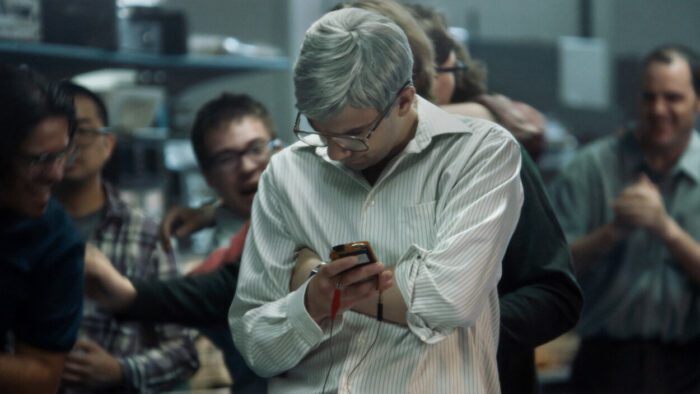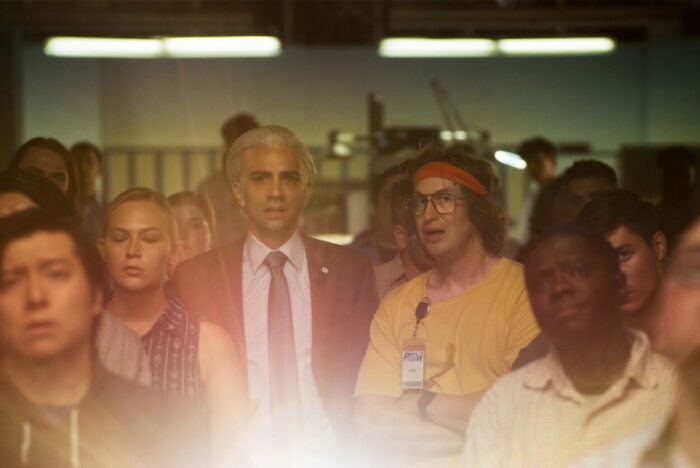It’s immediately obvious that there’s a mismatch between the trio behind the BlackBerry phone. The men in question, Mike Lazaridis (Jay Baruchel) and Douglas Fregin (Matt Johnson), are confident they’ve figured out how to create a phone that can access the internet. Their first pitch goes unheard partly because Douglas shows up in a sweatband and a DOOM shirt, but also because people cannot understand the product that Mike is describing. A phone that somehow accesses cellular data and can be used on the internet is something we take for granted now, but in 1996 when BlackBerry begins, it’s science fiction. It’s Jim Balsillie (Glenn Howerton) in that first pitch meeting we see with Mike and Douglas. Where they’re struggling to understand the corporate world, Jim knows it far too well. He’s the stereotype of loud, arrogant, and overbearing executive. It’s not until the trio comes together that this far-fetched dream becomes a reality.
Baruchel plays extraordinarily against type in BlackBerry. He usually shows up in boisterous comedic roles in films like She’s Out of My League, This Is the End, and Knocked Up. Yet here, Baruchel is a quiet nerd whose comedic moments are far more understated and few and far between. The same goes for Howerton, who has spent eighteen years as a lovably awful character on It’s Always Sunny in Philadelphia. He spends most of his time in BlackBerry screaming at every employee who crosses his path, but there’s no underlying lovable quality to his portrayal of Balsillie.

BlackBerry, on its surface, seems like a slick true-con disaster movie. As much as people love feel-good stories, they also love seeing the true events behind a famous piece of history. Even more so when that true story is filled with backstabbing, betrayal, and capitalistic failure. Of course, when talking about these based-on-a-true-story movies, one has to watch with a grain of salt. Director Matt Johnson has openly admitted that BlackBerry is not meant to be a biopic. Since BlackBerry is the first on-screen attempt at telling the story of the doomed device, the film had some freedom in the way it sculpted the narrative.
Blatantly ignoring history for lesser-known stories is frustrating, but almost immediately, it’s clear that BlackBerry is more interested in the people than the BlackBerry’s rise in popularity. Society isn’t well-versed in the rise and fall of the device, so choosing to focus on the human aspect creates a more accessible entry to this story. It’s not like The Dropout, where people were familiar with Elizabeth Holmes before they watched the miniseries. BlackBerry, in a way, was forced to be human-centric because Douglas Fregin, Jim Balsillie, and Mike Lazaridis are names that have flown below the radar for a long time.
There’s something excitingly novel about watching Mike valiantly try to explain what his device is capable of. It’s also somewhat eerie to think about how much has changed in such a small amount of time. The BlackBerry hit the market in 1999, not even 25 years ago, yet watching an executive marvel at the concept of typing with their thumbs seems outlandish. There are people now who type better on a small device with their thumbs than they do on a computer keyboard. There were even texting competitions in the 2010s.

There’s also something deeply sad about the way BlackBerry unfolds. Research in Motion, the company started by Mike and Doug that became BlackBerry, is scrappy and close-knit. It’s a bunch of computer lovers who are passionate about their jobs, but who also value the camaraderie the office holds. They have movie nights and video game competitions on a regular basis. There’s a moment near the beginning of the third act where Jim’s corporate mindset clashes intensely with the company Mike and Doug have created. Movie night is canceled and Doug is devastated, so he goes to Mike to express that he doesn’t like how things are changing. Mike, however, is trying to be the kind of person Jim is. The screaming, abusive, angry boss who will fire someone without even knowing their name if they talk back to authority. It’s a low moment to see Mike flip sides like that, and it’s made even worse by his darting eyes, as though he doesn’t believe his company needs to be run this way. BlackBerry shows how the scrappy, upstart tech industry became the toxic one it is now.
“We make the cell phone so fucking useful, you never have to come to the office again,” Jim proclaims. And, in a sense, Jim was right, but it wouldn’t be at the hands of BlackBerry. When they’re about to release a new phone with a trackpad, Apple announces the sleek and snazzy iPhone. Thus, the beginning of the end for Mike, Doug, and Jim. BlackBerry is a compelling blend of technology history, human relationships, and the ever-looming fear of becoming irrelevant.




